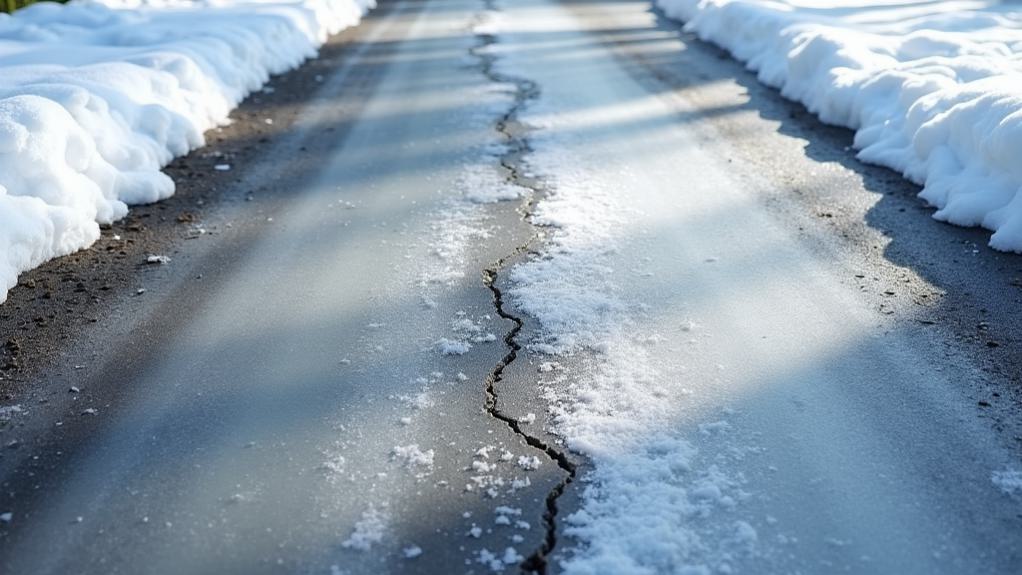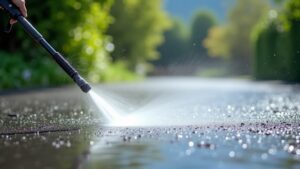Yes, using salt on your driveway can be harmful. Sodium chloride accelerates damage to concrete and asphalt surfaces by increasing freeze-thaw cycles. This leads to water infiltration, resulting in cracks and spalling.
Freshly poured or low-strength concrete is especially vulnerable, as salt can trap moisture and create expanding ice crystals.
Additionally, rock salt can worsen existing asphalt cracks, contributing to potholes. Alternatives like calcium or magnesium chloride can minimize damage while still effectively melting ice. You might find it beneficial to explore various deicing options and maintenance tips to protect your driveway’s longevity.
Key Takeaways
- Sodium chloride can damage concrete driveways over time, leading to increased repairs.
- Salt exposure accelerates freeze-thaw cycles, causing internal pressure and cracking.
- Freshly poured and low-strength concrete is particularly vulnerable to salt damage.
- Alternatives like calcium chloride or magnesium chloride are less harmful to driveways.
- Regular maintenance and sealants can help protect driveways from salt-related deterioration.
Effects of Salt on Driveways
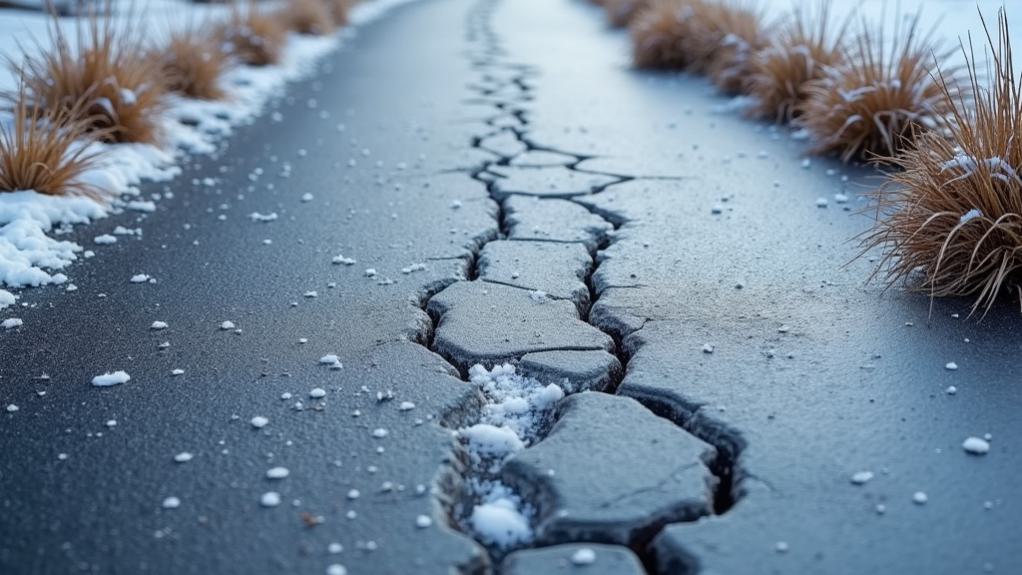
When you use salt to melt ice on your driveway, you mightn’t realize the hidden damage it can cause over time. Sodium chloride, commonly known as rock salt, can significantly affect the integrity of your driveway, particularly if it’s made of concrete.
The corrosive nature of salt increases the number of freeze-thaw cycles that occur, often leading to more frequent repairs and maintenance requirements comprehensive asphalt repair services. When water seeps into the concrete and freezes, it expands, creating internal pressure that can lead to cracking and spalling.
Freshly poured and low-strength concrete is especially susceptible to this damage because it tends to be more porous, absorbing water more readily. As the freeze-thaw cycles continue, the structural integrity of your driveway deteriorates.
Additionally, salt can also impact asphalt driveways, exacerbating existing cracks and potentially leading to potholes.
To mitigate this damage, consider alternative ice melt solutions like calcium chloride or sand, which pose less risk to your driveway’s surface.
Understanding the effects of salt on your driveway can help you make informed choices for winter maintenance, ultimately preserving the longevity and appearance of your concrete or asphalt surfaces.
Understanding Concrete Damage
Concrete damage is a critical concern for homeowners, especially in regions that experience freezing temperatures. As you may know, concrete is porous, making it susceptible to water and salt penetration. Sodium chloride, commonly used as a deicer, can significantly accelerate damage. The freeze-thaw cycles create internal pressure, leading to cracks and crumbling concrete.
To better understand the factors at play, consider the following table:
| Factor | Impact | Result |
|---|---|---|
| Porous Concrete | Allows water and salt in | Increased deterioration |
| Sodium Chloride | Expands in freeze-thaw cycles | Internal cracking |
| Fresh Concrete | More vulnerable to salt damage | Heightened risk of spalling |
| Ice Formation | Traps water in concrete | Expanding crystals |
| Coastal Climates | Constant salt exposure | Accelerated crumbling |
These interactions can lead to serious structural issues over time. Fresh concrete is particularly at risk, as it hasn’t yet fully cured, making it more porous than older concrete. Understanding these elements can help you make informed decisions about the care of your driveway.
Mechanisms of Salt Deterioration
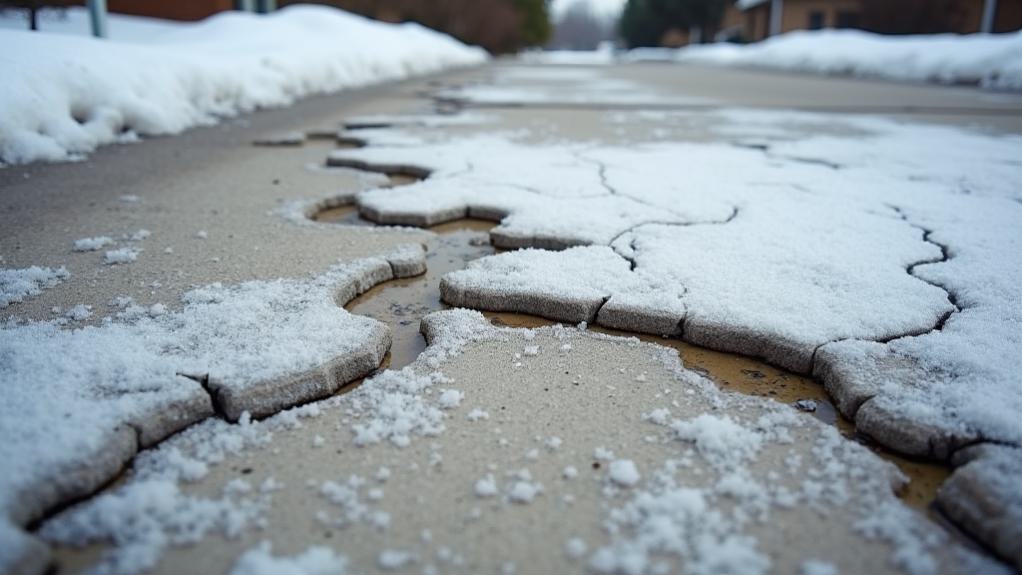
Numerous mechanisms contribute to the deterioration of concrete driveways due to salt exposure, primarily stemming from its chemical interactions and physical properties.
Salt, especially sodium chloride, significantly lowers the freezing point of water, which increases the frequency of freeze-thaw cycles that can inflict damage to concrete. During these cycles, water infiltrates the porous structure of concrete, and when temperatures drop, this water freezes, creating pressure from the expanding ice.
The presence of calcium chloride further complicates matters. When it interacts with calcium hydroxide in concrete, it forms expanding calcium oxychloride (CAOXY) crystals.
These crystals lead to internal cracking and crumbling of the driveway material. Over time, this process can cause discoloration and structural degradation, especially in areas with high sodium chloride levels, like coastal regions.
Freshly poured or low-strength concrete is particularly vulnerable due to its increased porosity, which enhances the risk of water infiltration.
Collectively, these factors underscore the importance of understanding the mechanisms of salt deterioration to protect your concrete driveways effectively.
Alternatives to Rock Salt
For those looking to protect their driveways while effectively managing winter ice, several alternatives to rock salt offer viable solutions. One effective option is Calcium chloride, which works well at temperatures as low as -25°F and causes less damage to your driveway compared to traditional sodium chloride. Magnesium chloride is another alternative that operates similarly without the harsh effects on concrete surfaces.
Additionally, heated driveways and portable snow-melting mats provide a proactive approach to preventing ice formation without using chemical deicers. If you’re considering a more natural solution, earthen drives with salt-tolerant herbs like thyme can enhance landscaping while eliminating rock salt concerns. Lastly, thorough shoveling, plowing, or snow blowing before applying any deicing method can significantly reduce your need for rock salts.
| Alternative Method | Benefits |
|---|---|
| Calcium Chloride | Less damage to concrete, effective at low temps |
| Magnesium Chloride | Similar effectiveness, pet-friendly options |
| Heated Driveways | Prevents ice formation without chemicals |
Long-Term Maintenance Tips
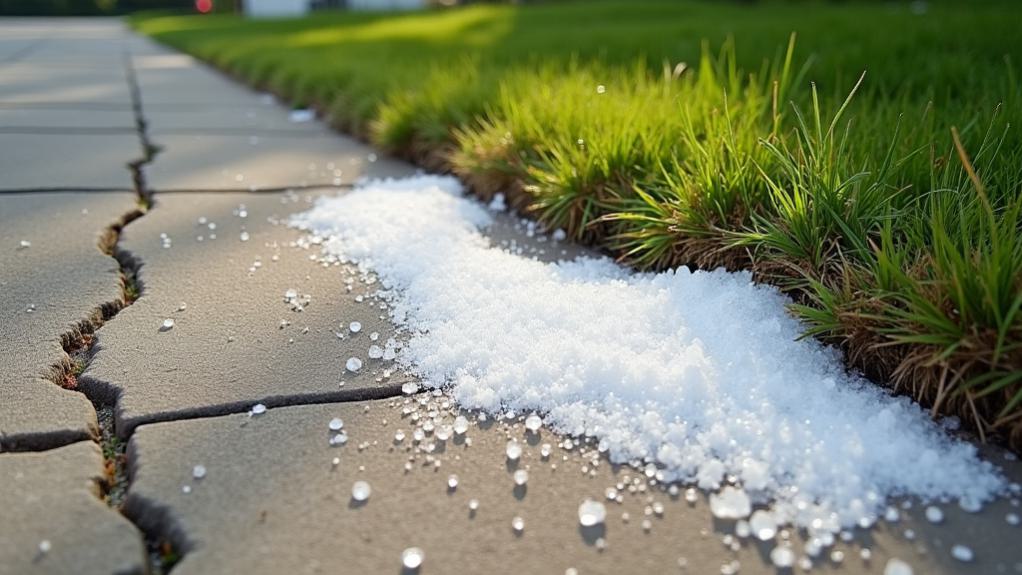
To maintain the longevity of your driveway and protect it from the detrimental effects of salt, regular upkeep is essential. Start by applying a protective sealant like Saltguard, which forms a barrier that defends against salt damage and extends your driveway’s lifespan.
Additionally, consider regular sealcoating to enhance the durability of your asphalt and reduce long-term maintenance costs, as noted in high-quality work recognized by clients. It’s crucial to monitor and repair any cracks or surface damage promptly, as untreated issues can worsen with freeze-thaw cycles and salt exposure.
In addition to sealing, consider alternative deicing methods such as calcium chloride or magnesium chloride, which are less harmful to concrete than traditional rock salt.
Timely snow removal is also important; it prevents ice formation and reduces the need for excessive salt application, minimizing the risk of damage.
Conduct annual inspections of your driveway to assess for any salt-related deterioration. This proactive approach allows you to take necessary preventative measures before winter sets in, ensuring that your driveway remains in good condition.
Choosing the Right De-Icer
Selecting the right de-icer can significantly impact the health of your driveway and surrounding environment. Rock salt, or sodium chloride, is the most common choice due to its cost-effectiveness. However, it can cause concrete damage by promoting freeze-thaw cycles, leading to cracks and deterioration over time.
For those considering new driveway options, utilizing Trusted Asphalt Paving Services in Lebanon can provide durable solutions that withstand harsh winter conditions. For colder climates, calcium chloride is an effective option, working down to -25°F, but it may still harm your driveway and nearby plants.
If you’re looking for a safer alternative, consider magnesium chloride. This pet-friendly de-icer is less likely to damage your driveway and lawns, effective down to 0°F.
Another option is calcium magnesium acetate, which, although more expensive, is non-damaging and poses minimal risks to pets.
When making your de-icer selection, assess the local climate conditions and potential risks involved. Choosing the right product not only protects your driveway from damage but can significantly extend its lifespan.
Conclusion
In conclusion, while salt can effectively melt ice on your driveway, it may lead to significant long-term damage. Studies show that concrete can lose 50% of its strength after just a few winters of salt exposure. To protect your driveway, consider alternatives like sand or environmentally-friendly de-icers. Regular maintenance and sealing can also prolong its lifespan. By being mindful of your choices, you can ensure your driveway remains safe and structurally sound for years to come.
